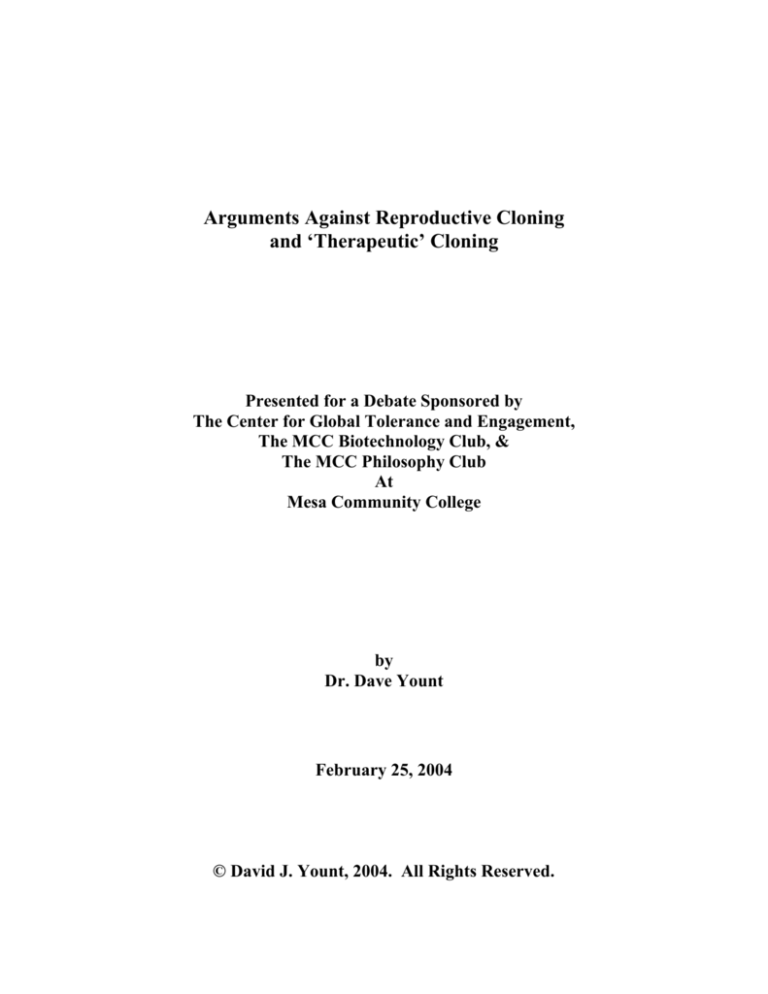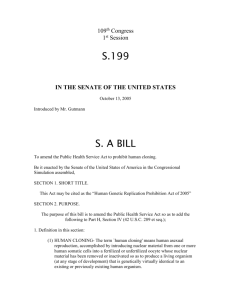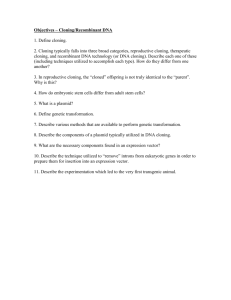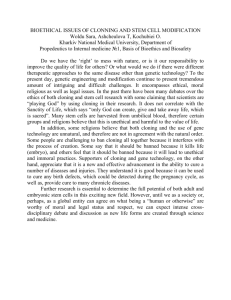
Arguments Against Reproductive Cloning
and ‘Therapeutic’ Cloning
Presented for a Debate Sponsored by
The Center for Global Tolerance and Engagement,
The MCC Biotechnology Club, &
The MCC Philosophy Club
At
Mesa Community College
by
Dr. Dave Yount
February 25, 2004
© David J. Yount, 2004. All Rights Reserved.
2
I. OPENING STATEMENT:
As bio-ethicist Dan Brock concludes in a recent 1998 Pro/Con study, “Human cloning …
stirs deep, but difficult to articulate, uneasiness and even revulsion in many people.” Tonight, I
will dare to articulate what I believe are the best arguments against reproductive cloning and socalled ‘therapeutic’ cloning. I will open with two further statements from Dr. Brock: First,
“Human cloning seems not to be the unique answer to any great or pressing human need and its
benefits appear to be limited at most”1 and second, “[Cloning] is not a central component of the
moral right to reproductive freedom and it does not uniquely serve any major or pressing
individual or societal needs.”2 Thanks for being here tonight.
II. MAIN ARGUMENT:
Let me first tell you how I am not going to argue, and then I will tell you how I will
argue, that cloning is morally impermissible.
I could argue from a religious perspective that cloning is morally wrong, but I will not
make that anti-cloning argument this evening, first, since every religion has not argued against
both research (or therapeutic) cloning and reproductive cloning3, and second, and more
importantly, I cannot prove to the satisfaction of everyone in this room which religion(s) is true
and which are false. So the argument against cloning based solely on religious grounds is not
persuasive without much additional argumentation and justification. Furthermore, the argument
that we are “playing God” seems very weak to me indeed. Why? Simply because nature,
disease, and the laws of physics, chemistry, etc., are forces that tend to destroy us, so every time
we take a vitamin or any medication, or see a doctor or have any medical procedure of any kind
performed, or perhaps even stay inside a building, we’re not “letting nature take its course.” If
we’re not playing God by starting people’s hearts back up, inserting pacemakers, and
administering the death penalty in Arizona (and I’ve heard no such claim in a credible argument
thus far), then I presume that it is a weak argument to argue this point in reference to cloning.
As to reproductive cloning, I will assume that there is a moral right to reproductive
freedom that may protect the use of human cloning, but, as Dan Brock argues, that “there may be
other moral rights in conflict with this right, or serious enough harms from human cloning to
override the right to use it.”4 As to therapeutic cloning, I will use the terms of the President’s
Council on Bioethics, namely research cloning; after all, it is more difficult to say that you
oppose therapy, is it not?
A. ANTI-REPRODUCTIVE CLONING ARGS:
I have three arguments against reproductive cloning (that is, the ‘Not IVF’ Argument, the
“Unacceptable Medical Risks” Argument, the ‘Psychological Harms’ Argument), and one
objection against a Clonaid website argument – I’ll refer to that objection as my “Anti1
Dan W. Brock, “Cloning Human Beings: An Assessment of the Ethical Issues Pro and Con,” Contemporary Issues
in Bioethics, 6th edition, Tom L. Beauchamp and LeRoy Walters, eds., Wadsworth, 2003, p. 595.
2
Brock, p. 602.
3
While the Pontifical Academy for Life (representing the Roman Catholic position) has argued that both
reproductive and therapeutic (or research) cloning are wrong, of four or five Islamic authorities that I’ve read, two of
them are proponents of research cloning (see http://www.religioustolerance.org/clo_reac.htm ).
4
Brock, p. 595.
3
Replacement” Objection. After these four arguments, I will make further arguments against
Research, or Therapeutic Cloning.
1. THE ‘NOT IVF’ ARGUMENT:
I grant that in vitro fertilization (IVF) is a kind of partially artificial reproduction, but it
essentially imitates the “natural process, and while [IVF practitioners] do begin to introduce the
characteristics of manufacture and industrial technique, they cannot claim to control the final
outcome as an artisan might shape his artifact. The end they serve is still the same – the birth of
a child from the sexual union of seed from two progenitors.”5 With reproductive cloning, “the
process would begin with a very specific end-product in mind, and would be tailored to produce
that product.”6 If a child were produced to be a certain way in advance, he or she would only be
being produced and really treated as a means to something other than just being a child to be
valued in and of itself. Scientists who clone animals are unquestionably treating animals solely
as a means, so if we clone humans we run the risk of treating human beings with the same
attitudes and approach.7 Lastly, many more eggs would be necessary in order to clone, as
compared to IVF, which could lead to women being treated as natural resources.
Therefore, reproductive cloning is not morally permissible.
2. THE ‘UNACCEPTABLE MEDICAL RISKS’ ARGUMENT
First, a very large percentage of cloning efforts end in failure (it took 277 attempts to
clone Dolly the sheep) and clones that do survive often have fatal or problem-causing issues in
their genes. For example, in one study, 24% of cloned calves died within 3 months of birth, 2%
of that due to chronic sickness.
Second, the President’s Council on Bioethics notes that the oldest successfully cloned
mammal was only 5 years old as of January 2002, so long term consequences are not known – in
some cloned mammals, premature aging, immune system failures, and sudden unexplained
deaths have already occurred.8
Third, there is some question as to why Dolly, the famous cloned sheep, did not live as
long as a typical sheep of her species. She had severe arthritis when she died.
Fourth, it is significant that “Ian Wilmut, one of co-creators of Dolly, has even said that
human cloning projects would be criminally irresponsible. Cloning technology is still in its early
stages, and nearly 98 percent of cloning efforts end in failure. The embryos are either not
suitable for implanting into the uterus or they die sometime during gestation or shortly after
birth. Those clones that do survive wind up suffering from fatal or problematic genetic
abnormalities. Some clones have been born with defective hearts, lung problems, diabetes, blood
vessel problems and malfunctioning immune systems. One of the more famous cases was a
cloned sheep that was born but suffered from chronic hyperventilation caused by malformed
arteries leading to the lungs.”9
5
President’s Council on Bioethics, Staff Working Paper 3b, p. 6.
President’s Council on Bioethics, Staff Working Paper 3b, p. 6.
7
President’s Council on Bioethics, Staff Working Paper 3b, p. 6.
8
President’s Council on Bioethics, Staff Working Paper 3b, pp. 2-3.
9
From: http://science.howstuffworks.com/human-cloning3.htm
6
4
Lastly, Weiss also warns that “… a cell many years old from which a person is cloned
could have accumulated genetic mutations during its years in another adult that could give the
resulting clone a predisposition to cancer or to other diseases of aging.”10
Thus, currently at the very least, reproductive cloning would essentially be equivalent to
intentionally creating malformed, genetically defective children, which would presumably either
be aborted or live very short lives filled with suffering. Therefore, reproductive cloning is not
morally permissible.
3. THE ‘PSYCHOLOGICAL HARM’ ARGUMENT:
Brock cites studies by 7 scholars that “Human cloning would produce psychological distress and
harm in the later twin. No doubt knowing the path in life taken by one’s earlier twin might often
have several bad psychological effects.”11 More specifically, “She might have a diminished
sense of her own uniqueness and individuality...”12 and “she might experience excessive pressure
to reach the very high standards of ability and accomplishment of the earlier twin.”13
If I clone my wife’s genes to replace her, wouldn’t she become my daughter, and wouldn’t this
be a heavy psychological burden for her to bear? Presumably, prohibitions against incest would
apply in this case, right?
This charge of psychological harm is necessarily and admittedly speculative, “since we have no
experience with human cloning and the creation of earlier and later twins. Nevertheless, if
experience with human cloning confirmed that serious and unavoidable psychological harms
typically occurred to the later twin, that would be a serious moral reason to avoid the practice.”14
To conclude the ‘Psychological Harm’ Argument, “Choosing to create the latter twin with
serious psychological burdens instead of a different person who would be free of them, without
weighty overriding reasons for choosing the former, would be morally irresponsible or wrong
…”15
4. THE ‘ANTI-REPLACEMENT’ OBJECTIONS (AGAINST THE ARGUMENT THAT
WE CAN REPLACE A DECEASED CHILD OR RELATIVE, AS PRESENTED ON
CLONAID’S WEBSITE16):
¾ First, cloning for this reason would create another person with the same genes as the
cloned person, but since the person would be raised in a different environment, a distinct
person would be created. The counterexample deals with twins: If you had two identical
twins, Sally and Suzy, and one passed away, you would not react as follows: “Oh, Sally
died, but that’s fine, because we’ve got the same genes right here in Suzy!” Moreover, in
10
This is Brock, quoting Weiss, 1997, on p. 600.
The authors of the studies or arguments are: Callahan, 1993; LaBar, 1984; Macklin, 1994; McCormick, 1993;
Studdard, 1978; Rainer, 1978; and Verhey, 1994 (Brock, p. 599).
12
Brock, p. 599.
13
This is Brock, quoting Rainer 1978, on p. 599.
14
Brock, p. 599.
15
Brock, p. 600.
16
Accessed http://www.clonaid.com/article.php?2.255 on 2/23/04.
11
5
the case of identical twins, typically they have been raised in roughly the same
environment; but notice how we think that, in spite of these similarities, they are distinct
people with different desires, life plans, and rights. So to think that we can replace loved
ones through reproductive cloning is to use mistaken and unsound reasoning.
¾ Second, as Brock puts it, “… parents of a child dying of a fatal disease would find it
insensitive and ludricrous to be told they should not grieve for their coming loss because
it is possible to replace him by cloning him; it is their child who is dying whom they love
and value, and that child and his importance to them is not replaceable by a cloned later
twin.”17
¾ Third, as the President’s Council on Bioethics raised, without the consent of the child or
other relative, this could violate the principles of reproductive consent (or human
experimentation), though the subject (the clonee) would not always be able to object or
consent to being cloned.18
¾ Lastly, and this is my point, given these other considerations, people need to learn to deal
with the fact that people die, and not think in terms of “replacing” anyone, because it
technically cannot be done, even with cloning.
B. ANTI -RESEARCH CLONING ARGS:
I have four arguments I will now present against research cloning: The ‘Anti-Abortion’
Argument, the ‘Therapy-Enhancement Blur’ Argument, the ‘Deal with Reality’ Argument, and
the ‘Anti-Medical Advancement’ Argument.
1. THE ‘ANTI-ABORTION’ ARGUMENT:
The fact that abortion is currently legal does not imply that it is moral, so my opponent’s
argument for destroying blastocysts or embryos is susceptible to some anti-abortion arguments.
First, I will extrapolate from Don Marquis’ argument against abortion, which is that
fetuses, being a unique combination of DNA, have a future like ours, so it is morally
impermissible to deprive them of such a future. Similarly, the embryo (or blastocyst) is arguably
in fact a unique individual, since in the case of cloning we do know whose DNA has been used
for research purposes (that is, the embryo will not be a natural combination of mother and
father’s DNA), and so the embryo has a future like ours.19 I recognize that, on the surface at
least, this appears to be an argument in favor of reproductive cloning, since it argues that we
should not destroy human life once it has started (and in this case, the life in question is a cloned
embryo). However, since I have already argued against reproductive cloning, there are separate
reasons against reproductive cloning, and if those arguments are good ones, then we should not
perform research cloning either.
Second, Judith Jarvis Thomson makes an interesting point that is relevant to the debate
here tonight. Ironically, she uses the following point to argue that abortion is moral: She asks
what it means to say that I have a right to life. Does having the right to life include having a
right to be given at least the bare minimum one needs for continued life? Her answer is no, and
17
Brock, p. 600.
President’s Council on Bioethics, Staff Working Paper 3b, pp. 3-4.
19
Here I’ve extrapolatied from Don Marquis’ argument in his article, “Why Abortion is Immoral,” Biomedical
Ethics, 6/e, Thomas Mappes & David DeGrazia, Boston: McGraw-Hill, 2001.
18
6
this is her example: “If I am sick unto death, and the only thing that will save my life is the
touch of Henry Fonda’s cool hand on my fevered brow, then all the same, I have no right to be
given the touch of Henry Fonda’s cool hand on my fevered brow.”20 Her argument actually
applies to research cloning as follows, supposing that I want to clone some cells of mine to grow
a kidney or another organ: If having a right to life does not imply a right to the bare minimum
needs for me to sustain life, then I should not have the right to stop an embryo from continued
life in order to sustain or improve my own. Think of it this way: If you’re comparing the right
to life of the embryo to simply continue to live (commonly referred to as a negative right), versus
the right to life of me, where I am in need of a kidney, and in order to obtain the desired kidney I
need to end a human life that is progressing to birth (commonly referred to as a positive right),
then it would seem that the negative right of the embryo’s continued existence outweighs any
positive right that I may have.
Thirdly, research cloning is more morally objectionable than reproductive cloning in this
way: The procedure for research cloning is the same as it is for reproductive cloning until the
embryo is implanted. However, engaging in research cloning entails the destruction of an
embryo, so therapeutic cloning is ethically wrong, no matter how appealing the consequence of
having compatible tissue is or might be to someone.
Therefore, research cloning is morally impermissible.
2. THE ‘THERAPY-ENHANCEMENT BLUR’ ARGUMENT:
If we allow cloning for research purposes, in order to enhance our genetic structures not only to
rid ourselves of genetic defects (i.e., negative eugenics or negative genetic engineering) but to
create “better” and “healthy” children (i.e., positive eugenics or positive genetic engineering),
these techniques “would threaten to blur and ultimately eliminate the line between therapy and
enhancement.”21 We may have all the good intentions in the world, “but in the process, we stand
to lose the very means by which to judge the goodness or the wisdom of the particular aims
proposed by a positive eugenics.”22
Therefore, research cloning is morally impermissible.
3. THE ‘DEAL WITH REALITY’ ARGUMENT:
People need to learn to live with disease and be responsible for their own life choices, and stem
cells are not the only possible avenue to pursue in order to prevent disease. If Nietzsche is
correct that “what doesn’t kill you makes you stronger,” then we need to deal with the fact that
we will all die, and that some of us will die from diseases for which we do not currently have the
cure. And, trying to cure these diseases involves killing a live human embryo. I will close this
argument with a quote from Plato’s Crito, “… the really important thing is not to live, but to live
well” (48b). Using medical technology when it does not involve the destruction of human life is
fine, but using any means necessary to stay alive is not always morally acceptable.
Therefore, research cloning is morally impermissible.
20
Judith Jarvis Thomson, “A Defense of Abortion,” Biomedical Ethics, 6/e, Thomas Mappes & David DeGrazia,
Boston: McGraw-Hill, 2001. pp. 469-470.
21
President’s Council on Bioethics, Staff Working Paper 3b, p. 4.
22
President’s Council on Bioethics, Staff Working Paper 3b, p. 4.
7
4. THE ‘ANTI-MEDICAL ADVANCEMENT’ ARGUMENT:
Some pro-cloners might argue that using cloning for the benefit of understanding human
development better and advancing science in general. Brock has three reasons for caution about
such claims:
“First, there is always considerable uncertainty about the nature and importance of the
new scientific or medical knowledge to which a dramatic new technology like human
cloning will lead. …. Second, we do not know what new knowledge from human cloning
or human cloning research could also be gained by other means that do not have the
problematic moral features to which its opponents object. Third, what human cloning
research would be compatible with ethical and legal requirements for the use of human
subjects in research is complex, controversial, and largely unexplored. Creating human
clones solely for the purpose of research would be to use them solely for the benefit of
others without their consent, and so unethical.”23
Therefore, research cloning is morally impermissible.
III. CONCLUSION:
To conclude both lines of arguments, in the words of Brock, “It is reasonable to conclude at this
time that human cloning does not seem to promise great benefits or uniquely to meet great
human needs,”24 and since both reproductive and therapeutic cloning involve morally
objectionable practices, they are morally impermissible.
© David J. Yount, 2004. All Rights Reserved.
23
24
Brock, p. 597.
Brock, p. 597.








